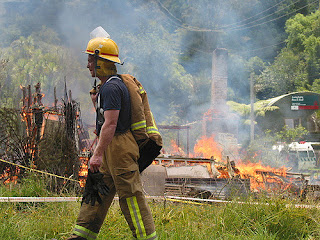They failed to take public safety, one of the FCC's mandates, into account when they muscled through their net neutrality repeal. And the FCC was too in their pocket to bring it up. Now they're being sued. JL
Colin Lecher reports in The Verge:
When news broke this week that Verizon was slowing California firefighters’ data speeds during a wildfire crisis, there was a predictable outrage over the company’s actions. The company didn’t restore speeds until the fire department paid for a better plan. A brief, filed by attorneys general in 22 states, argues that the FCC failed to take public safety into account when it passed repeal. “If the net neutrality rules were still in place, trust me, I don’t think there would’ve been a monthlong conversation about this.”
When news broke this week that Verizon was slowing California firefighters’ data speeds during a wildfire crisis, there was a predictable outrage over the company’s actions. In a legal brief filed by Santa Clara County fire officials against the FCC’s net neutrality repeal, emergency responders explained how Verizon dropped their connection to a crawl, even after being informed of the emergency. The company didn’t restore the speeds until the fire department paid for a better plan.While Verizon admitted that it made a customer service policy mistake, it was also quick to deny one point: “This situation has nothing to do with net neutrality or the current proceeding in court,” a spokesperson said in the first line of the company’s response to the incident.
Verizon, to its point, was throttling “unlimited” customers in less extreme circumstances who hit certain data thresholds well before last year’s net neutrality repeal. The legal brief also says the filers are not arguing that the throttling would necessarily have been a violation of the previous net neutrality rules, which were passed in 2015. Still, the filers of the brief do argue that the problem is about net neutrality in a different sense.The throttling may not have been a violation of the previous rules, but the brief, also filed by attorneys general in 22 states, argues that the FCC failed to take public safety into account when it passed its repeal. “That was part of the FCC’s original mandate: it needs to be thinking about public safety in its rulemaking,” says Santa Clara County counsel James Williams. As the FCC is required to consider the interests of public safety, the FCC’s repeal is therefore “arbitrary and capricious,” the brief argues.The throttling, the filers say, also showed how service providers will be willing to act in ways that benefit themselves financially in the absence of regulations. “We should expect nothing less than an ISP to act in its economic interest — that’s its job,” Williams says. (Verizon said in its statement that its practice is to not enforce slowdowns during emergencies and that it has removed similar restrictions in other emergency situations.)Others have pointed out that, under the previous rules, customers had a path to complain to the FCC when they believed throttling was unfair. In this case, that route was largely re-directed to the FTC, a structure that’s been criticized as insufficient.
Gigi Sohn, who worked on the net neutrality rules under the previous FCC chairman, argues that there is some question about whether Verizon’s actions would have violated the 2015 rules. But, regardless, she believes the repeal eliminated a route that would have given them recourse to make an expedited case in front of the agency, which could have resolved the dispute more quickly. Instead, Verizon and the fire officials had a frantic, lengthy back-and-forth over email, an exchange that appeared in the brief.“If the net neutrality rules were still in place,” Sohn says, “trust me, I don’t think there would’ve been a monthlong conversation about this.”




















0 comments:
Post a Comment